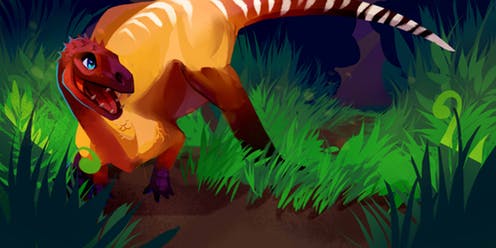This is an article from Curious Kids, a series for children. The Conversation is asking kids to send in questions they’d like an expert to answer. All questions are welcome – serious, weird or wacky! You might also like the podcast Imagine This, a co-production between ABC KIDS listen and The Conversation, based on Curious Kids.
Could you please tell me how many dinosaurs in total lived on Earth during all periods? - Viren, age 6, Scotch College, Victoria.
This is really great question.
The short answer is we know of about 900 valid dinosaur species that existed. “Valid” means scientists know the dinosaur from enough of the skeleton bones to feel pretty sure that it differs from all other known dinosaurs. There are hundreds of others which have been named, but are not considered “valid” as they were not based on well-enough preserved fossils.
To give you the long answer, first I need to explain what a dinosaur is, and when they lived.
What exactly is a dinosaur, anyway?
Dinosaurs were a group of medium to large reptiles that lived between 235 million years ago and 66 million years ago. Not many people know this, but the main thing that makes a dinosaur a dinosaur is their foot structure; they have a special kind of ankle joint. Their feet bones are like that of a bird.
Dinosaurs lived during three periods of geological time - the Triassic period (which was 252-201 million years ago), the Jurassic period (about 201-145 million years ago) and the Cretaceous period (145-66 million years ago). These three periods together make up the Mesozoic Era.
Just how many dinosaurs in total lived on earth during the Mesozoic era is impossible to answer. One study by a Polish scientist called Jerzy Trammer estimated total dinosaur combined weight was greater than all the mammals on Earth today, but their individual numbers were much lower than species of today’s living mammals.
Birds are descended from one group of dinosaurs called the predatory theropods. Theropods have hollow bones and three-toed limbs. Dinosaurs from the Tyrannosaurus are a type of predatory theropods. So, technically speaking, all living birds are “living dinosaurs”.
Discovering dinosaurs
Megalosaurus was one of the first dinosaurs to be properly studied. It lived in the Jurassic Period, about 160 million years ago.
Richard Owen created the word “dinosaur” in 1842, meaning “terrible lizard” because at the time he thought they were similar looking to large lizards. Today, we know they are not lizards, but a totally different kind of reptile.
Each year scientists dig up more new dinosaurs and get to name them. About 50 new dinosaurs are named every year.
I discovered a new dinosaur based on one bone in the museum collection in Perth. It came from the Geraldton region in Western Australia. It is Australia’s only named Jurassic theropod. I named it Ozraptor, meaning “the Lizard of Aus”.
As the fossil record of life is vastly incomplete, we can only guess that many, many more species existed - but we might never find their fossil remains.
At least we know that many new dinosaurs will continue to be found as expeditions keep going out searching for them every year. Most of the world’s new dinosaurs are coming from China, Mongolia and South America.
I’m really glad you are interested in dinosaurs. Who knows - maybe one day you will be part of an expedition that discovers a new dinosaur. If you found a new dinosaur, what would you name it?
Hello, curious kids! Have you got a question you’d like an expert to answer? Ask an adult to send your question to us. They can:
* Email your question to [email protected]
* Tell us on Twitter by tagging @ConversationEDU with the hashtag #curiouskids, or
* Tell us on Facebook

Please tell us your name, age, and which city you live in. You can send an audio recording of your question too, if you want. Send as many questions as you like! We won’t be able to answer every question but we will do our best.



 Fungi are among the planet’s most important organisms — yet they continue to be overlooked in conservation strategies
Fungi are among the planet’s most important organisms — yet they continue to be overlooked in conservation strategies  FxWirePro- Major Crypto levels and bias summary
FxWirePro- Major Crypto levels and bias summary  We combed through old botanical surveys to track how plants on Australia’s islands are changing
We combed through old botanical surveys to track how plants on Australia’s islands are changing  What’s so special about Ukraine’s minerals? A geologist explains
What’s so special about Ukraine’s minerals? A geologist explains  How America courted increasingly destructive wildfires − and what that means for protecting homes today
How America courted increasingly destructive wildfires − and what that means for protecting homes today  Swimming in the sweet spot: how marine animals save energy on long journeys
Swimming in the sweet spot: how marine animals save energy on long journeys 
































